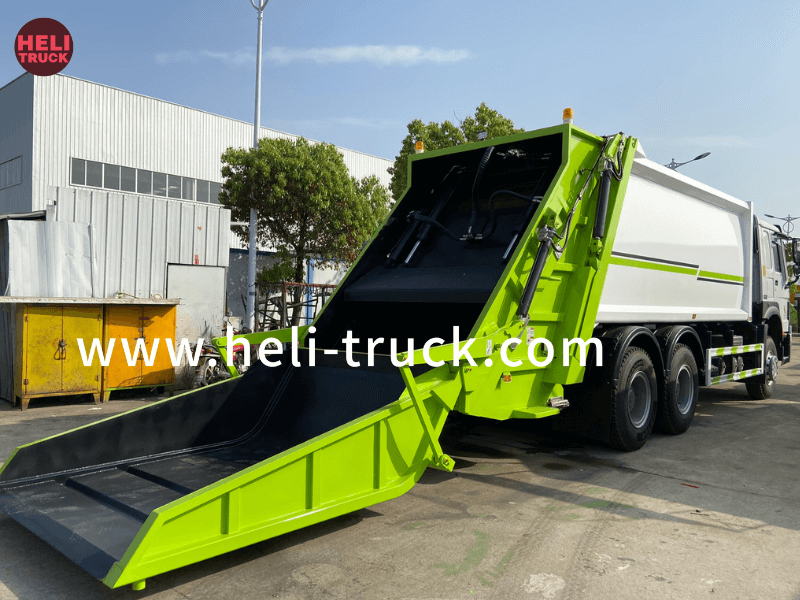The Unsung Heroes A Comprehensive Look at Garbage Truck Sanitation Workers

Introduction:
Garbage truck sanitation workers play a crucial role in keeping our cities clean and hygienic, yet they often go unnoticed and underappreciated. These unsung heroes work tirelessly day in and day out, collecting, sorting, and disposing of waste to ensure the well-being of our communities. In this article, we will delve into the world of garbage truck sanitation workers, exploring their responsibilities, challenges, and the impact they have on our daily lives.
Responsibilities of Garbage Truck Sanitation Workers:
Garbage truck sanitation workers are responsible for collecting waste from residential, commercial, and industrial areas. Their duties typically involve driving garbage trucks along designated routes, stopping at various locations to pick up trash, recycling, and other waste materials. Once the waste is collected, sanitation workers must carefully load it onto the truck, ensuring that it is secure and properly contained to prevent spills or littering.

In addition to collecting waste, garbage truck sanitation workers are also tasked with sorting recyclable materials from general waste. This requires a keen eye and attention to detail to identify and separate different types of materials, such as plastics, glass, paper, and metals. By sorting recyclables, sanitation workers help promote sustainability and reduce the amount of waste sent to landfills.
Once the waste is collected and sorted, sanitation workers must transport it to designated disposal sites, such as landfills or recycling facilities. This involves operating heavy machinery, such as compactors or shredders, to compress and process the waste for final disposal. Garbage truck sanitation workers must follow strict safety protocols and guidelines to ensure that waste is handled and disposed of in an environmentally responsible manner.
Challenges Faced by Garbage Truck Sanitation Workers:
Despite the essential nature of their work, garbage truck sanitation workers face numerous challenges that can make their job difficult and hazardous. One of the primary challenges is the physical demands of the job, which involves heavy lifting, repetitive tasks, and exposure to harsh weather conditions. Sanitation workers often work long hours, early mornings, and weekends to ensure that waste collection services are provided regularly.
Another challenge faced by garbage truck sanitation workers is the risk of injury due to the nature of their work. Handling heavy and potentially hazardous waste materials can lead to strains, sprains, cuts, and other injuries if proper safety precautions are not followed. Additionally, sanitation workers are exposed to various health hazards, such as toxic chemicals, sharp objects, and infectious materials, which can pose serious risks to their well-being.
Furthermore, garbage truck sanitation workers often encounter hostile or dangerous situations while on the job. They may face verbal abuse, threats, and even physical violence from residents or bystanders who are unhappy with the waste collection services. In some cases, sanitation workers have been involved in accidents or collisions with other vehicles while navigating busy streets and neighborhoods.
Impact of Garbage Truck Sanitation Workers on Our Daily Lives:
Despite the challenges they face, garbage truck sanitation workers play a vital role in maintaining the cleanliness and sanitation of our communities. Their work ensures that waste is collected and disposed of in a timely and efficient manner, preventing the spread of disease, pollution, and environmental degradation. Without their efforts, our streets would be littered with trash, and our neighborhoods would be unsanitary and unsafe.
Garbage truck sanitation workers also contribute to the sustainability and conservation of natural resources by promoting recycling and waste reduction. By sorting recyclable materials and diverting them from landfills, sanitation workers help conserve energy, reduce greenhouse gas emissions, and preserve valuable resources for future generations. Fuel tank truck cleaning in promoting environmental stewardship are essential for creating a cleaner and more sustainable world.
In addition to their environmental impact, garbage truck sanitation workers also play a crucial role in public health and safety. By removing waste from our homes, businesses, and public spaces, sanitation workers help prevent the spread of infectious diseases, pests, and contaminants that can harm human health. Their work ensures that waste is properly contained, managed, and disposed of according to established regulations and guidelines.
Conclusion:
Garbage truck sanitation workers are the unsung heroes of our communities, performing a vital service that is essential for our health, safety, and well-being. Despite the challenges they face, these dedicated individuals work tirelessly to keep our cities clean, hygienic, and sustainable. It is important to recognize and appreciate the hard work and sacrifices of garbage truck sanitation workers, as they play a critical role in maintaining the quality of life we enjoy. Next time you see a garbage truck on your street, take a moment to thank the sanitation workers who are working behind the scenes to keep our communities clean and healthy.
